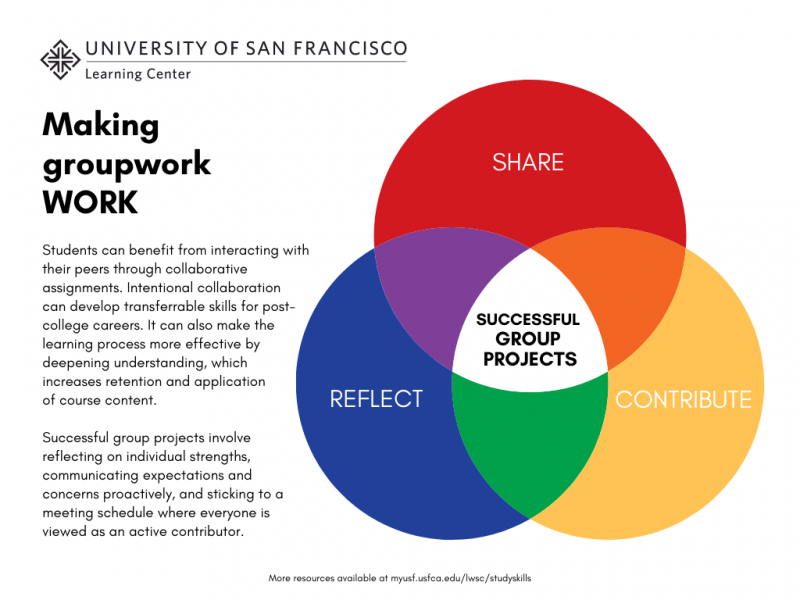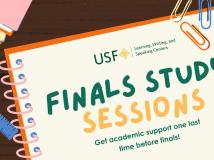Learning Center Study Skills & Resources
.png)
Upcoming Events
The Learning Center strives to foster the enhancement of academic skills and abilities to assist students in becoming independent learners by providing multiple layers of support to USF undergraduate and graduate-level students. With the goal of increasing student persistence and self-regulation, The Learning Center provides:
- Academic Skills Workshops (by request and pre-finals week each term)
- Academic Skills Coaching (one-on-one, hour-long appointments, in-person or online via Zoom)
- Online academic resources (included within this webpage)
For more information, please contact us at 415-422-6713 or lwsc@usfca.edu. You can also live chat with our Front Desk (during business hours) via the chatbox on any of our webpages (bottom right corner of the webpage).
Learning Center academic skills coaches are available to meet one-on-one with any USF undergraduate or graduate student to discuss academic skills and strategies, including (but not limited to):
- Time Management and Organization (includes prioritization and planning)
- Test-taking and Exam Preparation (includes positive thinking)
- Active Study (includes structured study time, note-taking strategies, and critical reading)
- Motivation and Goal-Setting (includes procrastination)
- Learning Styles and Preferences (includes an overview of campus study spaces)
- ...and more!
To schedule an individualized Academic Skills Coaching appointment, please log in to our centralized scheduling system.
Submit an evaluation of your Academic Skills Coaching experience here
(after your appointment)
Requested Workshops
Learning Center staff can facilitate workshops on an array of topics and skills. To request a Learning Center workshop, please fill out our request form and select one of our workshop offerings:
- "Time Management & '168' Prioritization"
- "Test-Taking and Exam Preparation"
- "Active Study – Part I (Note-taking & Reading Strategies)"
- "Active Study – Part II (Critical Thinking & Metacognition)"
- "Making group work WORK"
- "Exploring Learning Styles and Preferences"
- "Preparing for Finals: A 7-Day Study Plan"
The workshop request form seeks to gather as many details as possible to ensure we can prepare a relevant and useful experience for participants. Please review the available workshop descriptions within the form before submitting. If none of the workshop offerings seem to fit your vision, simply contact us at lwsc@usfca.edu or 415-422-6713 for more information.
A coach is available for all international students at USF (undergraduate and graduate) who desire assistance in cultural adjustment and developing strategies related to effective communication, collaborative learning, active studying, and time management.
International students can follow the "How to Schedule an Academic Skills Coaching (ASC) Appointment" instructions, and at step #6, select "Academic English Support" from the drop-down menu of programs.
For scheduling assistance, email LWSC@usfca.edu, call 415-422-6713, or utilize the chatbox on any of the LWSC webpage.
Time Management
- 7-Step Goal Setting Worksheet: 7-Step Goal Setting.pdf
- The 7-Day Study Plan
- PDF (to print): 7-Day Study Plan.pdf
- Excel (to download): 7-Day Study Plan.excel
- Google Drive (to view): SAMPLE 7-Day Study Plan
- Time Management & Prioritization: Ten Practical Suggestions
Prioritization
"The Power of Zero"
- The Power of Zero.pdf
- Excel (to download): The Power of Zero.excel
Stress Management Resources
- The Study Cycle.pdf
View an overview of
The Study Cycle - The Art of Taking Notes.pdf
- Critical Reading.pdf
- Active Reading.pdf
- GAMES Academic Skills Inventory - PDF version
- GAMES Academic Skills Inventory - electronic version
- Preparing for Office Hours.pdf
- Communicating with Professors: Ten Practical Suggestions.pdf
- Post-Exam Reflection Handout
Download the handout or "Make a copy" under the "File" drop-down menu within your Google Drive after opening the document. - A Guide to Managing Test Anxiety.pdf - from Student Disability Services
- Test Preparation: Ten Practical Suggestions.pdf
Test Prep: Positive Thinking Exercises
- Positive Thinking Exercise #1: Positive Contradictions.pdf
- Positive Thinking Exercise #2: Flash Cards.pdf
- Positive Thinking Exercise #3: Positive Inventory.pdf
- Positive Thinking Exercise #4: Controlled Breathing.pdf
- Positive Thinking Exercise #5: Dealing with the Fear Response.pdf
- Positive Thinking Exercise #6: Muscle Relaxation.pdf
- Positive Thinking Exercise #7: Rehearsing the Test.pdf
Resources related to physical spaces
Resources related to Receptive Learning Styles
- The Learning Center has permission to distribute the VARK, a widely-utilized questionnaire that helps students/learners identify learning strategies to utilize according to their natural preferences. If you are interested, please schedule an Academic Skills Coaching appointment to explore your learning style/preferences (select "Learning Styles" when scheduling).
Resources related to Personality Styles and/or Processing Styles
- Pathways to Learning / Multiple Intelligences Worksheet
Open this document within Google Drive; click "File" then select "Make a copy" to edit (this is a template). - Motivated Strategies for Learning Questionnaire (MSLQ) - forthcoming
Based on Pintrich, R. R., & DeGroot, E. V. (1990). Motivational and self-regulated learning components of classroom academic performance, Journal of Educational Psychology.

Characteristics of effective group work or study groups
- There is a range of individuals who contribute in different ways and are committed to learning from the experience
- There are clear goals and objectives that are agreed upon
- Individuals understand particular tasks they need to complete
- There is a balance between task (what needs to be done) and process (how it gets done)
- There is a "coordinator" for the group who may adopt a leadership style along a spectrum from autocratic (one person "in charge") to democratic (group consensus required)
Common challenges with group work or study groups
- Lack of clear objectives during group meetings (impacts productivity)
- Lack of task management or accountability outside of group meetings (impacts trust)
- Lack of communication, especially if students feel there are inequitable contributions from individuals in the group (could be real or perceived)
- Scheduling conflicts (students are balancing multiple, competing priorities)
Common expectations for collaborative learning environments
- Reflect on your individual strengths
- Communicate your personal expectations and concerns proactively
- Stick to the agreed-upon meeting schedule
- Ask clarifying questions, when needed
- Complete your assigned task and/or communicate with group members if you need more time
- View everyone, including yourself, as an active contributor to the group, even if contributions look different from each group member
Ways to explore your individual strengths
- Download and complete the Group Work Skills Questionnaire.docx to see if you are more task-oriented or relationship-oriented
- Complete the GAMES Academic Skills Inventory and identify academic skills you are "always" or "often" building in to your routine
- Ask 5 close friends or family members what they perceive to be the ways you contribute to a community/group; identify any common themes that arise and compare those to your own self-perceptions
- Reflect on the following questions and jot down your responses: What do I enjoy doing? What can I do consistently well, naturally? What skills am I committed to developing?
- Schedule a 1:1 Learning Center Academic Skills Coaching appointment to explore your academic strengths and/or areas needing improvement
- Take the CliftonStrengths assessment to identify your Top 5 Strengths (More info available at: https://myusf.usfca.edu/sle/cliftonstrengths)
Scheduling tips for study groups or group projects
- Start by identifying where everyone in the group lives (on-campus, off-campus, in the city, outside of the city, etc.) so commute times can be considered as well as reasonable times to meet during the week
- Share preferred methods of contact (email, texts, phone calls, etc.), and expect that not all members will have the same preferences; agree upon one method of contact that the group will use while working on the group project/assignment
- Use Google Calendar through DonsApps to schedule your meetings
- Create a (free) GroupMe to keep in touch with group members - "It's like a private chat room for your small group."
USF Campus Resources
Self-Care Resources
Websites & Applications
- Nursing: HESI A2 Pocket Prep app
- Nursing: HESI A2 Practice Test app
Test-Taking and Memorization Resources
- Memorization Strategies
- Mnemonics: Index of Popular Mnemonics
- OnlineSchools.Org: Guide for College Level Tests
"Great links for writers"
Additional Tools and Services
- USF CAPS Prioritization Video
- Study Blue: The online home for your class notes, flashcards, and course materials
- Evernote: Keep Tabs on Everything
- Remember the Milk: Electronic Reminders
- Free Mind: Free Mind Mapping Software
- Chegg: Online Study Community
- VassarStats: Statistics Computation Tool
- Connexions: Online Learning Community
- Online College Courses: Free online courses from the world's leading universities
- Study Hacks: Student success advice blog by students for students
- OCW Finder: Database of open course ware
